
If you don’t know who Vaush is, he is an up-and-coming Youtube commentator who has described himself as a ‘socialist’, ‘anarchist’, ‘anarcho-syndicalist’, ‘anti-capitalist’, and ‘communist’. I do not, however, believe he has ever described himself as a ‘pedophile’ and has even said he is ‘anti-child-pornography’. For the purpose of this blog, I am going to be assuming that he is neither a pedophile or a consumer of child pornography. The only reason I say this is because he has been labelled as such by individuals on the Right who use this as a kind of ‘get-out-of-having-to-address-his-arguments-free’ card that you pick up on the Monopoly board. It would be easy to simply insult him and pretend I “won”, but I believe that is an intellectually dishonest approach. This post is to address what he specifically has said recently in regards to child pornography.
Let’s focus on what was actually said first. In the first instance (that I am aware of), Vaush had a discussion with VeganGains, where Mr. Gains asked Vaush if pedophiles should not be held responsible for owning child pornography, to which Vaush replied:
“Yeah, I think it’s hypocritical. If I… cuz I bought my computer, and the silicon in it was farmed in Africa by slaves… if I can do that, and that’s legal and no one’s going to call me out on my shit, then yeah. I have to be consistent in that respect.”
In response to the criticism he was receiving for that analogy, Vaush had this to say:
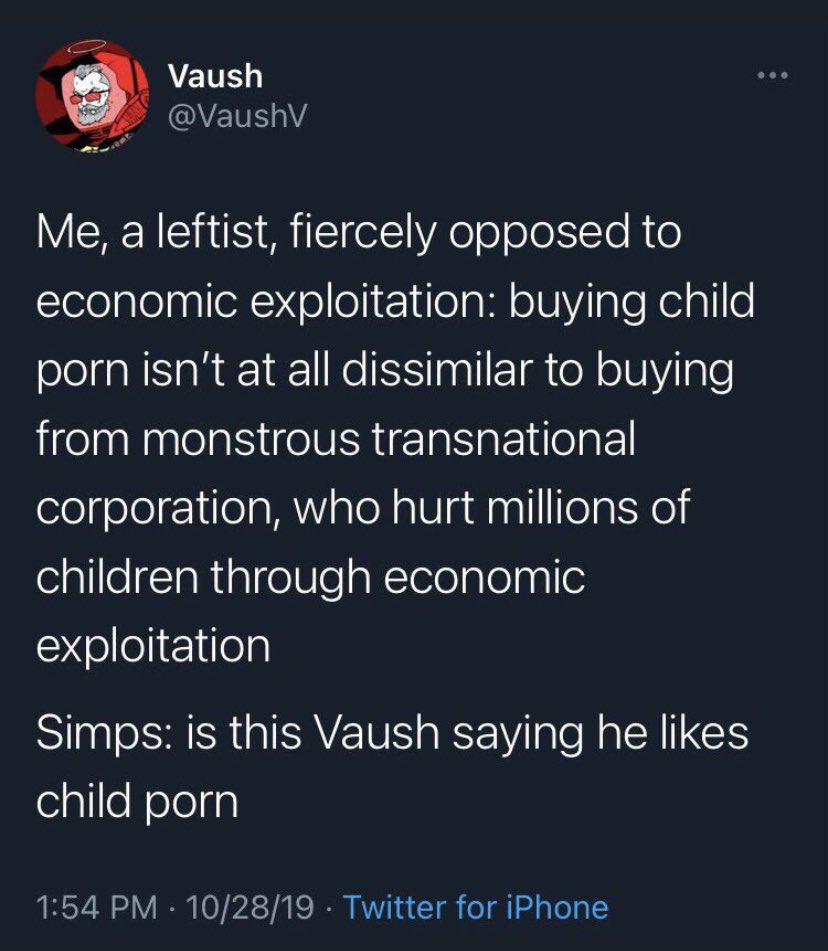
Note: I’m not sure why he used the term ‘simp’ here. It could be ‘ironic humor’
Despite his apparent tackling of the controversy, during a more recent stream, Vaush seemed to more explicitly state that he was not supportive of keeping child pornography illegal. He had this to say:
“[…] This is going to be a real hot take: I have yet to hear a convincing moral or legal argument as to why possession of child pornography should be illegal. Actual child pornography. How’s that for a hot fucking take?
Now, to clarify on this take, as I feel it necessary to do so, we do not, in this country, typically criminalize people who have procured media or resources that were the product of abuse. It is not illegal to own necklaces that have slave diamonds or… whatever they’re called. Blood diamonds? All of our clothes [are] produced by sweatshops, our computers, the silicon and lithium are mined from literally fucking slaves. Already, in our society, we have deemed that people are not responsible for the way in which the media they consume and content they engage with are produced.“
Vaush’s audience even attempted to dissuade him from saying this, but Vaush pushed back, and then added this:
“I am objectively right on this; they are morally identical. The difference being, of course, that there are far more people caught up in slave labor in the exploitation of the developing world than there are children we rape. So if anything, owning child pornography is probably a hell of a lot more ethical than wearing the t-shirts on your backs right now.”
Before I even attempt to unravel this yarn, I want to correctly break down what he’s saying, to the best of my ability.
In a market, there are producers and there are consumers. Producers make goods, and provide services. Consumers then purchase those goods, and/or use those services as they want or need, depending on if they can afford it.
Producers are not always producing legal or ethical goods or services. Sometimes, they produce multi-level marketing schemes, or drugs, or “financial advice”, or give “happy endings” at massage parlors, or create child pornography.
Furthermore, when producers do create goods that are legal, such as shirts, computers, skateboards, spoons, pencils, they do not always produce these goods in a way that is ethical, and in some cases, produce these goods in ways that would be considered illegal in developed countries.
I made a handy chart to show the similarities between the exploitation of labor and the sexual exploitation of children. Before you read it, I want to clarify two things: 1) The category ‘Unethical labor’ includes chattel slavery, serfdom, prison labor, and near-slave labor that works for very little pay. 2) Before you start screaming at me, I am presenting to you what I believe Vaush is attempting to say in his comparison of the two.

I think, logically, you can see that exploited labor producing goods can be very unethical. I do think there is something to be said for being conscious about where your products are coming from, and working with others to try and create better conditions for workers everywhere. After all, they’re working hard, and if their arm gets sucked into some rotating blade, they shouldn’t be discarded, where the Boss goes: “Oh well, I guess you’re fired and go die of starvation or blood loss now. Bye.” I think we can treat each other better than that.
There are some things I left off the list of comparisons. For example, child porn production literally rapes children. Their explicit goal is to rape children, and then record it. The CP industry does not produce any essential services or necessities. Also, there is room for improvement in ‘normal’ industries that produce consumer goods. There is no room for improvement in an industry that exists for the sole purpose of recording children being raped.
Despite the heavy exploitation of labor in developing countries around the world, many of the industries produce things that people need in order to live. These include: food, fuel for power plants, and clothing.
The reality of living in a country like The United States is that food and water are not the only things one needs in order to live. Electricity and transportation are vital parts of our lives. Without electricity, our houses would be too cold in the winter, and too hot in the summer. People would either freeze to death, or die of heat stroke. There are simply too many people alive to go “Well, just chop wood and have a fireplace.” This is not an option for any major urban area that go through cold winters, like Chicago or New York City.
Transportation and clothing are also essential to living in a modern, industrialized society. Without transportation, our options are severely limited. Without clothing, we are effectively unable to participate in society. That may change in the coming decades, but right now, we’re still living under public decency laws and “No shirt, no shoes, no service”. Furthermore, much of the population of the US, all of Canada, most of the UK, most of Europe and Russia, and many parts of eastern Asia require warm clothing for winter.
By contrast, child pornography is not an essential commodity. Vaush does mention that luxury items, like diamonds, would fall into this category of being unnecessary luxury commodities. I agree with this. No one needs a diamond. However, a diamond can be mined without harming the labor used to produce it. Child pornography can never be produced without harming the labor used to produce it.
When goods are produced, the goods serve a purpose. That purpose can range from benign (pet rocks) to life-saving (insulin), so whether or not a product is produced by unethical or even slave labor, the product still generally serves a positive function in society. Again, the work conditions by which these goods are produced can definitely be improved. However, in the child pornography trade, the product is rape. So, not only is the work environment impossible to improve, the final product is essentially human suffering in the form of rape. This is media of rape occurring.
The presumption that child pornography and the exploitation of workers are morally equal is further controverted by the fact that the specific work hazards involved in underground sex work are unique to the field. According to the International Programme on The Elimination of Child Labour, “While it is practically impossible to know the true extent of the problem, given its hidden and illegal nature, ILO global child labour figures for the year 2000 estimate that there are as many as 1.8 million children exploited in prostitution or pornography worldwide. While the age that a child becomes involved may be quite young, 15 to 17-year olds are most affected. These young people often suffer irreparable damage to their physical and mental health. They face early pregnancy and risk sexually transmitted diseases, particularly AIDS.“
According to the Wikipedia article on the commercial sexual exploitation of children,
Research has shown that “fifty to ninety percent of children in brothels in Southeast Asia are infected with HIV.” In many cases when children are brought into the sex trade industry they are beaten and raped until they are so broken they no longer try to escape. Physical hazards can also include infertility, cervical cancer, assault, and sometimes murder. Pregnancy is also a physical risk factor for many children. Much like if they are found to have HIV or AIDS the girls are thrown out of the brothels with nowhere to go.
The only ‘workers’ who endure these types of hazards against their will are sex slaves and rape victims. Sure, a factory worker can breathe in asbestos, but they’re not being raped. I don’t make this distinction to say that one form of suffering is more inherently relevant than another, but to say that these are different forms of suffering. One form of suffering is preventable through safety standards that are not employed due to apathy, whereas the other is deliberately inflicted. Most slave labor is not put to work because their owner is a comic-book villain, but rather, for changeable social, political, and economic reasons. Sex slaves often are also often put to work for economic reasons, but also exist as slaves for the explicit purpose of providing sexual pleasure to whomever uses the sex slaves.
Worse yet, child pornography is most likely to affect one of the most vulnerable populations that exist, which are prepubescent children. I know that child labor is a huge problem, but again, because of the differences between the type of exploitation between child labor and children who are used for sex, I personally find the subjection of prepubescent children to pornography to be considerably more egregious.
Concerning Children ‘consenting’
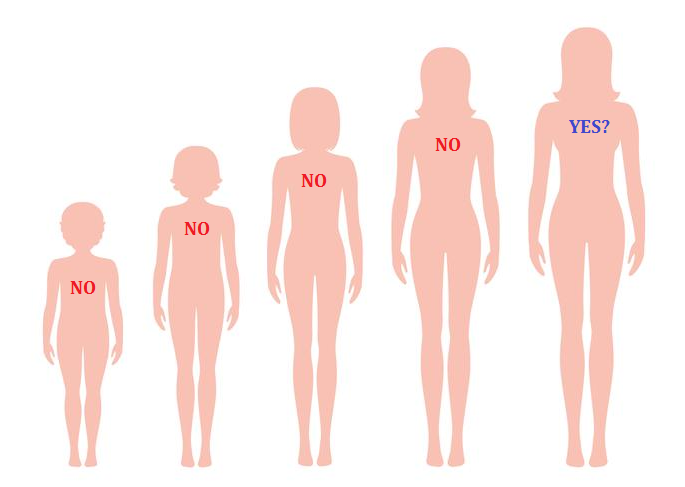
When I’m discussing age-of-consent with anarchists and libertarians, the question always arises: Is today’s society’s standard for age-of-consent a relic of puritanical government overreach? (or something like that)
I only bring this up because even if the majority of child pornography is rape taking place, one could presumably ask: “What if, in certain instances, the child is consenting?”, and in a law-free world, the legality of the scenario is no longer an issue. It then becomes an issue of morality. For many people, the answer is pretty cut-and-dry; their personal moral code forbids it.
When discussing child pornography with a libertarian, I cannot give an objective reason why it should be forbidden. Even if my morality forbids it, I cannot say to the libertarian that they must adhere to my moral code, because a fanatical individualist will almost always certainly object to the imposition of my will over theirs. But I can offer to explain my logic.
I don’t believe that humans are completely atomized individuals. I believe that we have to collectively work to ensure that our communities are happy, healthy, and are living fulfilling lives. One way we can do this is to look at studies and data for what makes life better, and what makes life worse. I’m certain that one of the things that can make life objectively worse is having a regrettable sexual interaction. Regretting sex, obviously, can happen to anybody, but I feel like the younger someone is, when something sexual happens to them that they later wish was not a part of their life, the more of a cascading affect it can have.
From a utilitarian point of view, it is better to protect my children than to let them out into the wild to die. This isn’t a “traditional family” argument, but rather, a community argument in general. After all, “my children” can be orphans that I look after in my community. Within our communities, we make an agreement with each other: don’t harm my children, and I won’t harm your children. Furthermore, if we find that having sex with children can harm their psychological development, then having sex with children would logically fall under the umbrella of not harming children. Eventually, society gets together and asks: “Really now, what even is a child?“
From there, the definition can get kind of murky. Does childhood end at the beginning of adolescence? Does it end at the end of adolescence? Depending on who you ask, the answers can vary, but a female who gets pregnant at age 11 is more at risk to have complications while giving birth than a female at age 18+. While socioeconomic factors play into the risk, physical attributes, such as underdeveloped hips, can also play a significant role. I only bring this up to use as one example of a problem with considering a female a ‘woman’ at the beginning of puberty, rather than after. Other issues that can arise when considering an early adolescent a viable sexual partner is if they become a parent. We then have to consider if they have the ability to sustain themselves financially, ability to continue their education, their maturity, and their decision-making skills.
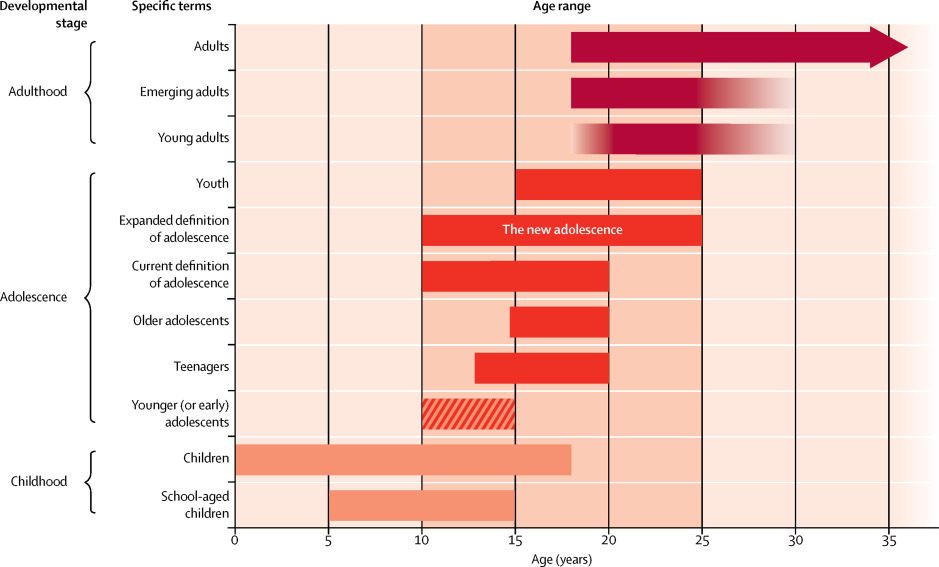
If the duration of adolescence (or puberty, depending on the definition we’re using) fall into a spectrum of age-ranges, then ostensibly, in order to minimize the potential suffering caused by STIs, unwanted pregnancies, physical harm caused by rough sexual encounters, and so on, the prudent thing for society to do would be to classify a legal sexual partner as someone who falls into a later age-range of adolescent development.
And that, as a modern civilized society, is what we did. I wouldn’t allow a 12-year-old of mine to sign a binding contract with a 46-year-old, and also would not allow a minor to make a decision about sex with an adult. That is essentially the agreement society came to. It was a long and incredibly complicated series of societal decisions made for the betterment of society.
“Owning child pornography is probably a hell of a lot more ethical than wearing the t-shirts on your backs right now.”
This section is mostly directed towards Vaush personally.
Dear Vaush,
I know after the VeganGains debate, you addressed your comments made during that debate by saying it was deliberately edgy 400-IQ bait to get people to debate you. That’s fine. I only am writing this because now you’ve followed up on that by saying “I have yet to hear a convincing moral or legal argument as to why possession of child pornography should be illegal“, which seems to be a separate argument than equating exploitation of slave or near-slave labor to child sexual abuse.
If I were asked “Why should child pornography be illegal?”, here would be my logic: first, we can see that access to child pornography has substantially increased the market for child pornography.
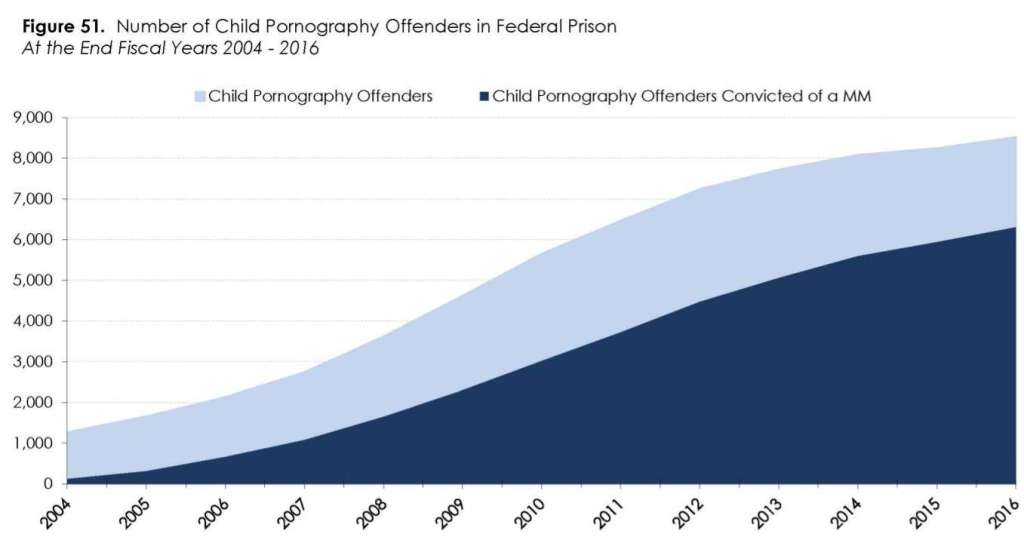
(I’m not a reader of reason.com; I just like the graph.)
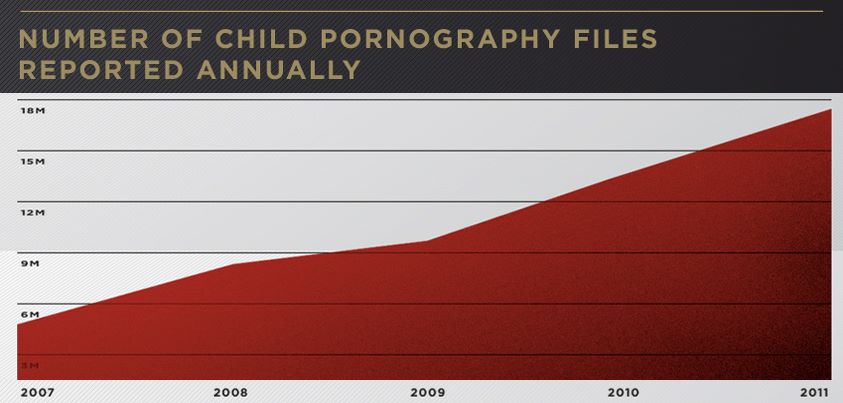
The number of people being convicted of possession of child pornography has exploded since the early 2000s. As internet usage has increased, so have the number of criminal cases involving child pornography. This means that internet users are directly contributing to the proliferation of this market.
Right now, as it stands today, the best solution seems to be to punish those who contribute to the proliferation of child pornography, and to get them away from their computers. If you were to ask me if I’d be in favor of some kind of therapy for CP consumers, I would probably be in favor of it if it was shown to be effective. Right now, that sort of thing doesn’t seem like it even can exist in a macro-scale capacity, because the public is generally very unsympathetic towards sex offenders who harm children, and would probably not want their tax-dollars spent on people they hate.
Therefore, it seems like the best way — as of right now — to deal with child porn is to prosecute the creators and consumers. If you have a better idea, I’d be fine with discussing that.
As far as a moral equivalency between the production of goods like clothes, and the production of child pornography, I disagree with that for the reasons I’ve already written about above. But I want to add to that by giving my own spicy take: whether or not I buy a shirt does nothing. My participation or non-participation in the consumption of necessary or very common consumer goods does not contribute or mitigate the worker exploitation around the world.
Because the sheer scale of clothing, electronics, and agricultural production is so unbelievably massive, an individual consumer can’t really make any difference in that system. It is akin to your position on individual consumers trying to stop global warming by turning off their lights. The fact that there is a massive global enterprise-based creation of waste makes the average individual consumer’s actions virtually null in comparison.
You may ask: “If that is your take, then why would you hold the individual consumer of child pornography responsible?“
Unlike agricultural products, or electronics, or clothing, child pornography is not mass-produced. It is a type of transactional exploitation that takes place on a much, much smaller scale than global industrial production. Although it is true that there is a large amount of child pornography produced, it is largely decentralized, and on a relative scale to clothes production, it’s much smaller.
“Doesn’t that just mean I’m right?” (sorry 4 strawman)
Not necessarily. If the argument is simply “both kinds of exploitation are bad”, then I’d agree with that. But to say “Owning child pornography is probably a hell of a lot more ethical than wearing the t-shirts on your backs right now.” is wrong because the smaller an industry is, the more of an effect the individual consumer has on it. Like if I own a shop, and I have 10 customers, and 1 leaves, I’ve lost 10% of my income (assuming they all pay the exact same amount of money), but if I own a shop and have 1,000 customers, and 1 leaves, it really doesn’t matter. Structural exploitation, for that reason, requires a lot of people to change, as opposed to transactional exploitation, which can be affected by individual actions.
Bonus study from researchers in Uganda
Conclusion
vaush wrong